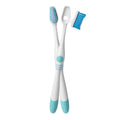Deciding between a manual and electric toothbrush can be a daunting task, with each type boasting its own set of advantages and disadvantages. In this guide, we'll delve into the pros and cons of both manual and electric toothbrushes to help you make an informed decision about which one is right for you.
Manual Toothbrushes:
Pros:
- Affordability: Manual toothbrushes are widely available at a low cost, making them accessible to everyone regardless of budget.
- Portability: Manual toothbrushes are lightweight and compact, making them ideal for travel and on-the-go use.
- Control: With a manual toothbrush, you have complete control over the brushing process, allowing you to customize the pressure and technique to suit your preferences.
Cons:
- Effort Required: Manual toothbrushes require more effort and dexterity to use effectively, as you must manually move the brush to clean each tooth thoroughly.
- Inconsistent Brushing: Without built-in features like timers or pressure sensors, it's easier to brush for inadequate durations or miss certain areas of the mouth, leading to less effective cleaning.
- Potential for Damage: Aggressive brushing with a manual toothbrush can lead to gum recession, enamel wear, and tooth sensitivity over time.
Electric Toothbrushes:
Pros:
- Efficiency: Electric toothbrushes are designed to provide consistent and efficient cleaning with minimal effort, thanks to their rapid bristle movement.
- Built-in Features: Many electric toothbrushes come with built-in timers, pressure sensors, and multiple brushing modes to enhance the brushing experience and promote better oral hygiene habits.
- Effective Plaque Removal: Studies have shown that electric toothbrushes are more effective at removing plaque and reducing gingivitis compared to manual toothbrushes, resulting in improved overall oral health.
Cons:
- Cost: Electric toothbrushes typically have a higher upfront cost compared to manual toothbrushes, and ongoing expenses include replacing brush heads or batteries.
- Requires Charging: Electric toothbrushes need to be charged regularly, which can be inconvenient for travelers or individuals with limited access to power outlets.
- Learning Curve: Some users may find it takes time to adjust to the sensation and technique of using an electric toothbrush, particularly if they're accustomed to manual brushing.
In conclusion, both manual and electric toothbrushes have their own set of pros and cons. The best choice for you depends on your personal preferences, budget, and oral health needs. Whether you prefer the simplicity and affordability of a manual toothbrush or the advanced features and efficiency of an electric toothbrush, the most important thing is to brush regularly and effectively to maintain a healthy smile.



